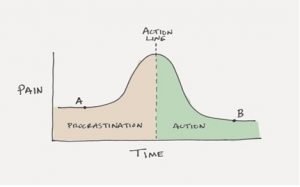
Though it may sound like a very unique word, given our lifestyles, it basically defines most of us. Roughly one out of every five people is a chronic procrastinator. Many people may think of procrastination as just being lazy, but there is more to it. Etymologically, the word procrastination originated from a Latin verb “procrastinare”. Dr. Tim Pychyl professor of psychology and member of the Procrastination Research Group at Carleton University in Ottawa mentioned that “Procrastination is an emotion regulation problem, not a time management problem,” It has more a psychological side to it than just a bad character flow. A motivational psychologist also mentioned how procrastination can be viewed as ‘self harm’. The particular nature of our avoidance can depend on the given task and risk involved. It might be the disgust towards the task or due to self-doubt, low self esteem insecurity and so. For example some may think that they are not talented enough and thus end up procrastinating.
Interestingly another view on why people procrastinate can be explained by the ‘time inconsistency’ phenomenon. This phenomenon states how the human brain values immediate rewards than the future ones. Basically imagine that there two of us –the Present self and the Future self. If we want a flat stomach then the Present self has to start working out and dieting so the Future self looks stunning with a flat stomach. But when the time comes to take action, our brain thinks of our Present self and thus move towards immediate pleasure instead of hard dieting for the sake of the Future self. It is as simple as our Future self wanting abs but the Present self decides on having a doughnut instead.
There can be four types of Procrastinators, categorized based on the reasons as to why they procrastinate. They could be
- Thrill-seekers- those who find it adventurous to have deadlines closing up on them. They are too overconfident on the ability to get things done.
- Avoiders- those who avoid the work because of their low self esteem, their fear of failure and/or they are overly conscious towards others opinion.
- Indecisive– those who avoid making decisions on starting the work mostly because they do not want to be held responsible
- Perfectionists- those who get bogged down in details. These folks start a task but they can’t finish it because it isn’t perfect.
Now that we have the definitions and the reasons, we also have to take a look at the particular concept called the Procrastination Action line. So it basically refers to how the pain is high when we are transitioning from procrastination and going into a working pace. Through statistics we can even conclude that maximum pain is faced in the middle of procrastination in the middle of work. Once we start out work it is actually no pain at all, though this starting point is the trouble. All this makes us realize that relying on long term merits and reward will not keep our Present self motivated.
”So you ask how can I not procrastinate? How do I stop harming myself?. The main step to this is to find the core of the problem and to understand that downloading apps to manage and attain self control isn’t going to help. We should all first be aware of the way our brain works, in short the habit of “the bigger better offer” as Dr. Brewer, Director of Research and Innovation at Brown University’s Mindfulness Center mentions. Instead of self loathing, one has to start forgiving themselves for procrastinating to get their emotions in control. Not only that, in a 2010 study, researchers found that students who were able to forgive themselves for procrastinating when studying for a first exam ended up procrastinating less when studying for their next exam.
There are many other ways which can help us avoid procrastinating. Some of these include:
- “You” Making rewards more immediate and powerful- like doing things you love when you do things you procrastinate on
- Making negative consequences more immediate- just like the reward system, this could be the consequences that the present self has to face for procrastinating. For example you can make a promise with a friend on a diet routine and if you skip you would be the one to break the promise. This might be misinterpreted for self harm and bad mental health
- Giving yourself enough time to complete tasks – Making more time for tasks, even for a small one.
- Use visual aesthetic cues- Visual cues can help because they remind you of your work every time you eyes catch them
- Plan your action to a T – as I heard from someone, if you don’t have a plan on what you are going to do, you are just wasting time. “Motivation follows action. Get started, and you’ll find your motivation follows”
By only knowing all these methods for not procrastinating is nowhere near enough. Only if we move we will go further higher from where we are right now. So instead of running away or putting it aside try to face it. In fact I myself as a chronic procrastinator follow The Paper Clip strategy – one of the visual cues to get the work done. So now get out of your bed and let’s start by just making the bed and cleaning our room and finally removing those cups from your room shall we?!l!
